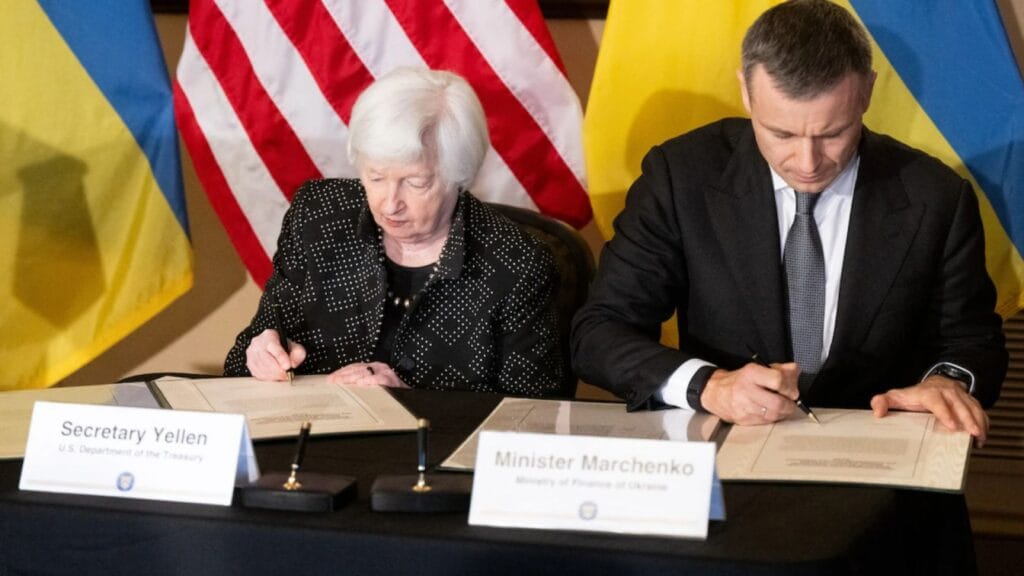A major step to ensure the financial stability of Ukraine, Treasury Secretary Janet L. Yellen and Ukrainian Finance Minister Sergii Marchenko marked a joint celebration Wednesday over a landmark agreement. They agreed to a $50 billion loan to Ukraine, months after stalled negotiations resulted in a breakthrough. The financial cushion shall come when cash is urgent before the end of the year.

This loan program depends more on the interest that is expected to be earned over around $280 billion worth of Russian central bank assets. Funds locked out due to Russia’s invasion of Ukraine in 2022 are held in Western accounts. It is estimated that frozen funds stand to earn a few billions of dollars annually, which will be reimbursed over time to the loaners. The U.S. is to cough $20 billion by year-end, with its European and other Western allies expected to chip in over $30 billion.
One of the key factors of this deal is that if the war ends before interest will recover the total amount of the loan, Russia will have to refund it. This is done in order not to burden US taxpayers. Meanwhile, the finance ministers of other countries are attending meetings in Washington together with the International Monetary Fund and World Bank. Economic aid does not come tomorrow.
She declared that Russian President Vladimir Putin is holding “a contest of wills” with the coalition and relies on the latter to blink. Mrs. Yellen, therefore urged that the coalition was not to back down but to “stand up” for Ukraine as she remarked. President Biden echoed the same sentiments, saying this loan would remind Putin that the international community is united behind Ukraine.
This move, the Kremlin has labeled an infringement on its sovereignty. Russian spokesperson Dmitry Peskov argued that this decision to use its assets constitutes “illegal expropriation.” Supporters of the plan believe Russia must be held to account for its actions in Ukraine. With the U.S. entering election season, such concerns are growing of course, with fears about how a future Trump presidency could shape future support for Ukraine.
READ MORE | What is BRICS Pay: Russia’s Push for an Independent Payment System
The degree of dysfunction has to do with the depth of the financial deficit, which can go as high as $45 billion next year,” said Oleg Ustenko, economic advisor to the Ukrainian government, adding that Ukraine needs this sum of money not only to keep the government services going but to avoid a serious slowdown in the economy and for this reason, it has a dual significance, says Ustenko, covering loans. It is a powerful signal of support to Ukraine in its ongoing campaign against Russia. It helps reduce risks generated by potential cuts in U.S. support if Trump were elected.
Since the beginning of the war, the United States and its European allies have imposed sanctions that have effectively frozen assets in the Russian central bank. Even though U.S. officials have been talking about seizing those funds to support Ukrainian reconstruction, a chorus of European voices has run scared at such an act as a lawless move that could damage investor confidence. The only strategy that both sides can stomach is one of merely allowing accruals on those assets.
This notwithstanding, logistical challenges have been holding off the provision of aid. America communicated that it would not accept those loans if the suspension of E.U. sanctions available to unfreeze Hungary’s assets were ever untied. Other pains were on how Hungary handled this problem mainly concerning their prime minister Viktor Orban; that sanctions require a unanimous vote every six months has only complicated the process of reaching consensus among the members of the E.U.
With Donald Trump as president looming in the wings, European partners pushed with urgency at the end of the year to seal this loan deal. In spiked-up negotiation recently, the European Union upped its ante and offered Ukraine between 35 billion euros, roughly $38 billion. With the U.S. now moving forward with its own commitment, however, there remain worries among some congressional Republicans about financial implications for American taxpayers who, since the war began, have contributed more than $100 billion in aid.
MIT economist Simon Johnson said this loan is of great importance, “The implication is to China and all the rest of them, to behave yourselves; adhere to international security norms, and reap the benefits from the global economy.” He considers the agreement a “remarkable achievement” for the U.S. Treasury, emphasizing that countries benefit from the global economy but also should play by the rules.
In my opinion, this financial agreement not only displays strength and determination to contribute on behalf of Ukraine by the U.S. or its allies but also serves as a strategic way to hold Russia accountable for its actions. However, it is critical to examine how these financial decisions play out domestically, considering elections are approaching. That calls for sustained support for Ukraine, but in a manner that resonates well with American opinion.
Minutes by M31GlobalNews






